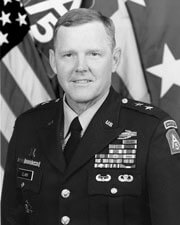The nomination, which has been stalled in the Senate for 14 months, now advances to the full Senate for an up or down vote.
In the four years since Winchell’s murder, Pat and Wally Kutteles, the dead man’s mother and step-father, have argued that the Army has not accepted full responsibility for their son’s death, which they say was caused by the Don’t Ask, Don’t Tell military policy and official neglect. The Kutteleses believe that Clark should be held accountable for a failure of leadership in the matter.
In July 2000, the Army inspector general cleared Clark and other officers at Fort Campbell of any wrong-doing, despite substantial evidence of harassment and official neglect presented at trial and the claim by a former soldier there on “60 Minutes” that just weeks after Winchell’s murder, sergeants there again began using a rhyme, “Faggot, faggot, down the street, shoot him, till he retreats,” when drilling the troops. The Kutteles were also judged ineligible for any compensation from the Army for the loss of their son.
In May, after meeting with the Kutteleses, Sen. John Warner of Virginia, the Republican Armed Services chair, said no committee vote would be held until the Army responded to questions from Winchell’s family. Shortly thereafter, perhaps bowing to political reality, Clark finally agreed to a long-standing request from the Kutteleses for a face-to-face meeting in May. But the meeting likely hurt his cause. Both Pat and Wally Kutteles told Warner and Gay City News that Clark played the victim in his meeting with them.
“The feeling I was left with was that he was picked on, by the press, by us, by SLDN,” Pat Kutteles said. “That he’s had nothing but four years of bad times.”
Because there was a voice vote, there is no official record on how members of the committee, which has 13 Republicans and 12 Democrats, voted. Only three senators––Hillary Rodham Clinton (D-NY), Ted Kennedy (D-Mass.), and Daniel Akaka (D-Haw.)––have made public statements about their votes, and all of them opposed Clark.
Other senators, including Armed Services Committee Republican Susan Collins of Maine––who told NBC News this spring, “There is compelling evidence that there were problems at this base”––have voiced concerns about Clark’s nomination.
According to Sharra Greer, director of policy and law at the Servicemembers Legal Defense Network, “There are still a lot of senators with concerns.”
Greer, however, knew of no concrete steps any senator had yet taken to derail the nomination in the full Senate. With Republicans in the majority, Clark’s success in Armed Services may well bode well for his eventual nomination.
––Paul Schindler
































